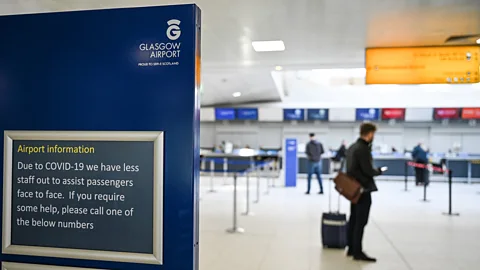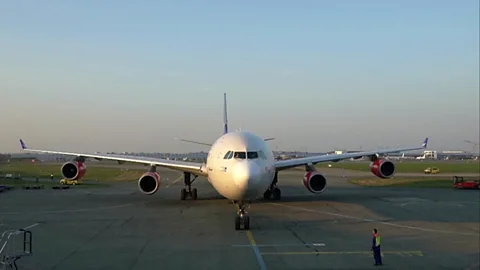Your questions answered: How Covid-19 has affected travel
 Jeff J Mitchell/Getty Images
Jeff J Mitchell/Getty ImagesWhat are your rights if you’ve had trips cancelled? How do you cope if you’re stuck in a country in lockdown? And just what does the future hold for all our travels?
Global tourism has increased exponentially over the past 60 years. As travelling has become more accessible, it has never been easier to learn about the world and connect with people of different cultures. But with restrictions put in place in an attempt to contain the global coronavirus pandemic, destinations that are usually swarming with visitors look very different now.
Governments have warned against non-essential travel and the European Union, Australia, New Zealand and other countries have stopped foreign arrivals altogether. With an increasing number of places in lockdown, many tourists had to cancel their holidays, while others have been left stranded abroad.
What can you do if you find yourself in those situations? Here are some answers from The Travel Show’s Simon Calder.
There are lots of people who are stuck somewhere and many think they’ve lost lots of money. What’s your advice?
It is such an unusual situation that, at this stage, it’s really a question of “fly first, ask questions later”. There are all kinds of experiences where the enger-rights laws should take effect. The airlines are simply ignoring those. They have very little choice, they say. The situation is completely out of control. Travel insurance, too. Of course, many people are assuming that their problems will be covered by that, but unfortunately, it won’t for possibly weeks or months. When the dust has settled, people will actually find out what they can claim back. But it’s going to leave many people out of pocket and, of course, sadly, many great travel professionals out of work.
Your advice is “get that flight, get home”?
Very much so. If you know that the government of the country you are in is banning international flights in two days’ time, just get online and find a flight. In extremes, go to the airport and just see what you can find. Most people, I hope, will be able to get out.
 BBC's The Travel Show
BBC's The Travel ShowWhat are some of the most common problems hitting your inbox at the moment?
Absolutely the most pressing is “I’m in country X, I’m trying to get home. Help, what do I do?” And all I can say is: assume you won’t get any help from your airline, from your insurance company, even from your embassy. You have to make the decisions now. There is no time to lose. Spend what you need to, get family and friends to pay for your ticket, but just get yourself out. And then, ask questions later.
Some people can’t get through to their own embassy. Is that common?
The normal workload at a consular department, at an embassy, is a handful of people every week. Maybe lost ports, getting into trouble with the law, sickness cases. They are simply not cut out for the situation of thousands, sometimes hundreds of thousands, of nationals all being in the same position of having to leave the country at top speed. I’m not really surprised that this is happening. The systems we have in place were simply never designed for the worst emergency that has ever happened in travel.
A lot of people are saying they’re having trouble getting through to their airlines. One person says they were on hold on the phone for three hours. Many airlines are just simply overwhelmed. What would your advice be if you can’t get in touch with your carrier?
They certainly are. If you have given it your best shot and you could not get an answer in a reasonable time, then I’m afraid you have to make your best decisions. Spend whatever you need to, keep receipts, and make a reasonable claim afterwards. And, by the way, if you get and try to sort things out online, in many cases, airlines are saying “Oh, just accept a voucher for future travel”. If your flight actually gets cancelled, which is happening an awful lot, you’re entitled to a cash refund. A voucher might not do you any good. So hold out for real money.
How would you say the insurance companies are responding to the situation?
Travel insurers, like everybody else, are in uncharted territory. They are understaffed, their finances are under tremendous pressures. In some cases, you can go to the Financial Ombudsman Service in the UK who, if they think there is a valid claim, will make the insurer pay it. Of course, around the world there will be local laws which may or may not offer some help. All I can say is that the insurance industry is not going to be in a hurry to pay people out because this is going to cost it billions.
 NurPhoto/Getty Images
NurPhoto/Getty ImagesNick Smith tweeted from the UK “After Six Nations match was cancelled in Paris”, he says, “I got a full refund for my hotel but the train company is charging me £70 to change my return ticket and offering no refund.” What would your advice to Nick be?
We heard from so many sports fans who have been planning trips based on a particular event, which is then being cancelled and they’re saying, “What do we do?” I’m afraid, in Nick’s case, and many others, the train company is perfectly able to take him to Paris and back. The fact that he doesn’t want to go, they would say “It isn’t our problem.” And they are applying their and conditions as they’re entitled to do. So the only thing I would say to Nick is, well, at least be glad you got a refund on the hotel.
The future of travel
Airlines are already struggling with cancelled flights and some carriers have requested financial aid from the government. The airline industry faces its biggest crisis since the 9/11 attacks and many companies have grounded up to 90% of their fleets. The hospitality industry was also impacted with places across the world shutting down. The World Travel and Tourism Council (WTTC) estimates up to 50 million jobs could be lost because of the global coronavirus outbreak. The WTTC also suggests the travel industry could shrink by up to 25% in 2020.
But according to aviation analyst Paul Charles: "We will get through this. We have an inherent desire to travel. It's in our DNA. The virus is not going to kill that off. We will want to travel again and the industry will recover."
BBC's Travel Show brings you the latest insider travel news, a wealth of destinations, amazing experiences and features and practical hints, tips and advice for your holidays.
If you liked this story, sign up for the weekly bbc.com features newsletter called "The Essential List". A handpicked selection of stories from BBC Future, Culture, Capital and Travel, delivered to your inbox every Friday.
{"image":{"pid":""}}
